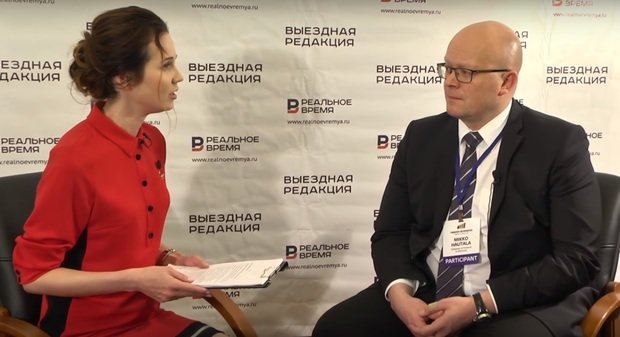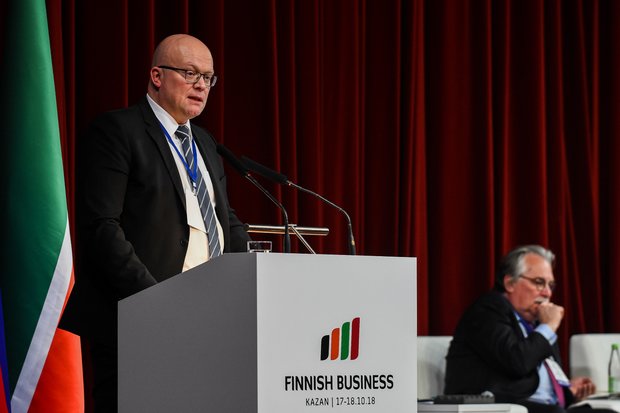Mikko Hautala: ''Finland is the biggest investor in the Russian economy''
The ambassador of Finland to Russia tells why neighbouring countries can’t avoid disagreement and the first summit of the Arctic Council in history
The biggest annual business event of Finnish-Russian business Finnish Business took place last week in Kazan. Extraordinary and Plenipotentiary Ambassador of Finland to Russia Mikko Hautala chaired a delegation of Finnish companies. In an interview with Realnoe Vremya, he told why their country supported sanctions against Russia and what Finland was recognised the happiest country in the world for.
''It's impossible not to have arguable moments''
Finland has been recognised the happiest country in the world in the UN World Report published in the spring. What do you think made the Finns feel the joy of living more than others in the world?
I think this surprises many Finns too that we turned out the happiest country in the world. By the way, we didn't aspire to it but wanted to create a comfortable, steady life for the Finns. As a result, we obtained such a status. We can take it easier, of course: to suppose that it's because we drink 10 times more coffee than others.
But still, why do you think many Finns were shocked by the news that they became 'the happiest country in the world'?
I think all people have their own unsolved problems anyway. Not every person feels everything is easy in life.
This year, such a factor as immigrants has been included to the UN report. What's the dynamics of immigration to Finland on a year-on-year basis? Where do immigrants come from more often?
People immigrate to Finland from different points of the world. It's EU zones, Near Eastern, African countries.

Finland is the biggest investor in the Russia economy per capita. Our investments total over €12bn. Actually, we think the sum is bigger. A share of investments goes through third countries, but it's Finnish capital
Migrants from North African and Near Eastern countries try to get to Finland via Russia. How do you solve the problem of refugees crossing the Russian-Finnish border?
Cooperation between our border services works very well. And such illegal border crossings take place very rarely. We have reliable border control. I'd say the situation is stable.
In other words, don't you have problems with refugees?
No.
As an EU member, Finland takes part in sanctions against Russia due to disagreement on Ukraine and Crimea. What are the international issues our countries have disagreement about?
I think our relations are good and reliable despite the context but considering what's happening, in general. Undoubtedly, sanctions were imposed, and Finland thinks they need to be imposed until the reasons for which they were imposed disappear. And, unfortunately, at the moment we think there aren't reasons to lift sanctions. This is why we continue the politics.
What other disagreements do you see besides the situation around Ukraine?
I think there are political, business or economic disagreements. It's how it should be between countries that have a big flow of trade, investments. It's impossible not to have arguable moments. It's a normal process. But there is no political disagreement like that of Ukraine.
''Sanctions are high political risks''
Keeping talking about sanctions and business, four big Finnish players have left the Russian market or announced the sale of businesses this year. Other companies are also ready to say goodbye to their assets. What are the reasons: new sanctions, higher prospects in the domestic market?
I think each company decides itself how it will work and which market it will choose. But I want to say that the Russian market has over 900 companies. It's a very big number compared to the volume of our country. And the majority of these companies have remained in the market. And only some companies are leaving the market. It's, in general, linked with their business plans. Sometimes leaving a market is a rational decision. I don't see any outflow.
Finland is the biggest investor in the Russian economy per capita. Our investments total over €12bn. Actually, we think the sum is bigger. A share of investments goes through third countries, but it's Finnish capital.

''As for our bilateral relations with Russia, we have very close links. We work in shipbuilding. Our scientific cooperation is very developed, and we constantly talk about the Arctic at different levels.'' Photo: Oleg Tikhonov
How do you assess the current economic situation in Russia?
We've noticed growth, of course. It's not big, but it's still growth. Sanctions have their impact, of course, especially on investment decisions because sanctions are high political risks. And companies take into account they exist, and it influences the atmosphere.
How would you evaluate the business climate of Tatarstan?
We have a very good evaluation. And we, of course, follow the climate. Finnish companies working in the republic say it's good to work here. They get support. And new companies understand what conditions were created here. I'm sure we will see new projects in Tatarstan.
Finland, which is chairing the Arctic Council now, has announced the Arctic Summit will be held in the first half next year. What will be the key issues at the summit? How do you assess the cooperation with Russia in the Arctic, in general?
Firstly, we've announced the plan of a possible summit at the moment. A decision of all participants to take part at the summit is needed. Of course, we want to hold such a summit – the first summit in the history of the Arctic Council. I think the agenda will include ecological issues, safe transportation via the Northeast Passage from a perspective of pollution. And other participants are also offering problems that concern them. We, of course, will consider their offers.